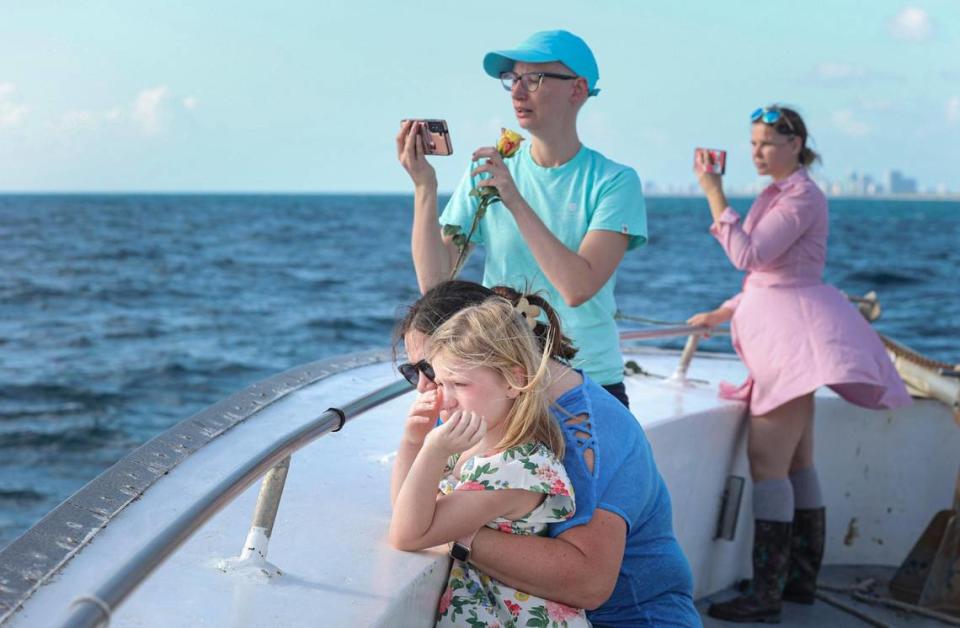Can you scatter human ashes anywhere you want? What Florida law says about that
Can you scatter ashes of your loved ones anywhere you want in Florida?
State laws don’t regulate where you can store or scatter cremains, according to funeral homes including Florida Family Cremations. According to legal site Nolo.com, no Florida laws restrict where you may keep or scatter ashes.
The only Florida statute dealing with cremation focuses on the cremation process and what may happen if ashes are not claimed within 120 days from the time of cremation. The funeral home or disposal establishment may dispose of the ashes.
KNOW MORE: Demand grows for Florida funerals that preserve nature, cut pollution
Otherwise, here’s what you can and can’t do when spreading ashes or designating the spread of your own:
Scattering at sea

Scattering ashes at sea is the first image that comes to mind for many. But know this:
The federal Clean Water Act, which also governs scattering ashes in inland waters like rivers and lakes, requires that cremated remains be scattered at least three nautical miles from land. The Environmental Protection Agency doesn’t offer permits for scattering ashes at beaches or shorelines — although that hasn’t stopped some people.
You can go out to sea by yourself if you have access to a boat. Or funeral homes including Van Orsdel offer scattering at sea services during which their team spreads the ashes for you in the Atlantic off Miami’s coast. Officials there can help plan a private charter, too. The funeral home also files the EPA paperwork for you.
Ocean Ashes in Islamorada in the Florida Keys offers a $550 ash-scattering cruise for up to six passengers. The company also supplies rose petals, and, as with the funeral home plan, you’ll get a certificate of scattering at sea by mail after the service.
For more information on scattering ashes at sea, including the contact information for the EPA representative in Florida, see the EPA’s Burial at Sea page.
KNOW MORE: Undersea memorials to loved ones also may help revive Florida’s dying coral reefs
Private property
You can scatter ashes on your own private property. If you want to scatter ashes on someone else’s private land, it’s best to ask permission.
If your mom or dad loved the Dolphins or shopping at Publix, scattering their ashes on the goal line at Hard Rock Stadium or in the deli line may not be granted.
KNOW MORE: Can you bury a body in your backyard? What about your pet? What Florida law says
Public property
Although Florida doesn’t have laws against scattering ashes, you may want to check with your county or city should you wish to scatter ashes at a South Florida park.
Federal land
You can scatter ashes in federal parks including the Everglades or Biscayne National Park. But there are some protocols to follow.
You need a Special Park Use Permit that you can obtain on the National Park Service site.
“The scattering should be a small private affair, held away from high visitor use areas,” the park site says. “Because cremains cannot be placed or dispersed within 100 yards of a body of water, road or trail, or within developed areas, this activity is not permitted at Convoy Point.”
The ashes must be fully refined with no detectable remains that let passerby note these are human remains (teeth, bones, you get the idea). The ashes should also be completely dispersed and not piled in one location or buried.
And while you’re scattering, don’t disturb any of the park’s natural resources.
You can’t leave a monument, memorial, plaque, structure, urn, photo or any other commemorative item inside the park to mark the spot — and that includes potted plants, dried flower arrangements or any plant with seeds because doing so could introduce non-native or invasive species.
The park service won’t treat the area as sacred or as a burial ground or cemetery. So once you have scattered the ashes, park uses resume without regard to the presence of the cremains.
Scattering from the air
Florida doesn’t prohibit the scattering of ashes by air, but the Federal Aviation Administration has guidelines prohibiting the dropping of anything from a plane that could injure people below. Ashes are fine but not the hard objects that may contain them.
So the licensed pilot who takes on the task can’t drop the urn, for instance. Just the ashes.

